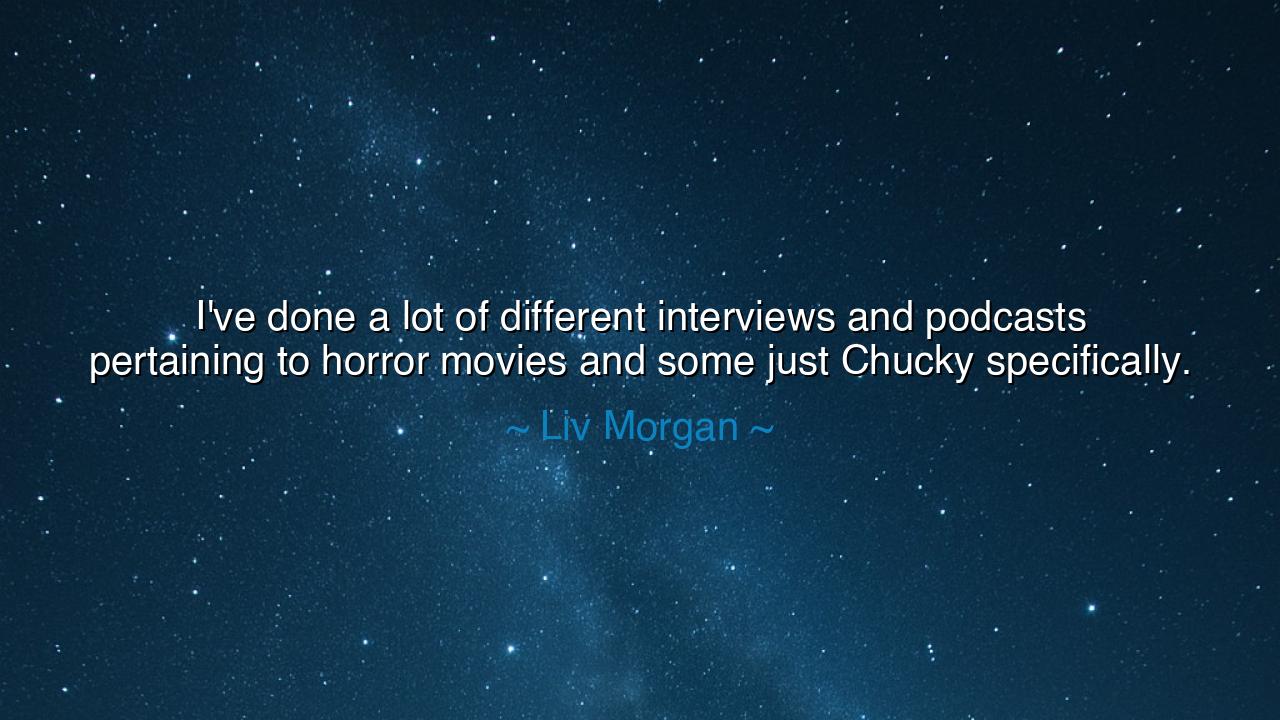
I've done a lot of different interviews and podcasts pertaining
I've done a lot of different interviews and podcasts pertaining to horror movies and some just Chucky specifically.






Ah, Liv Morgan, a voice that echoes with both passion and dedication, speaks of her involvement with horror movies and the iconic Chucky: "I've done a lot of different interviews and podcasts pertaining to horror movies and some just Chucky specifically." These words, though seemingly simple, hold within them a deeper truth about identity, legacy, and the way in which the stories we tell shape the world around us. Morgan, in reflecting on her journey through the world of horror films and specifically the Chucky franchise, points to the power of storytelling—how even in the realms of fear, we find connections to deeper human truths, and how we, as creators and participants in these stories, become part of something larger than ourselves.
In the ancient world, the great storytellers understood the immense power of narrative, particularly when it came to the darker aspects of existence. Consider the Greek tragedians, such as Aeschylus and Sophocles, who wove tales not just of heroes and gods, but of human suffering, moral ambiguity, and the monstrous forces that lurk within us all. These stories, though steeped in tragedy, were not merely about fear—they were about understanding the human condition. Similarly, horror films like Chucky serve not just to scare or entertain, but to explore the darker recesses of the human psyche. Morgan’s role in these films serves as a reflection of the universal struggle we all face against the unknown, the uncontrollable, and the terrifying aspects of life that we often try to ignore.
There is, however, a deeper lesson to be drawn from Morgan’s reflection. She speaks of doing interviews and podcasts, engaging in conversations about the films she has been a part of, and by doing so, she becomes part of the ongoing dialogue around these stories. In the same way that the ancient orators and philosophers engaged with their communities through public dialogue, so too does Morgan engage with modern audiences through her reflections on her involvement in the Chucky franchise. The ancient Greeks, such as Aristotle and Plato, understood that knowledge and wisdom were to be passed down through conversation, through dialogue. Morgan, through her words and experiences, contributes to the ongoing conversation about what these films mean, how they reflect our fears, and how they shape our understanding of the world around us.
In fact, much like Socrates, who believed in the power of questioning and engaging others in thoughtful dialogue, Morgan’s participation in interviews about Chucky and horror films is a modern-day version of that same pursuit. She not only brings her experiences into the conversation, but she opens the door for others to reflect on their own relationships with fear, storytelling, and art. Through podcasts and interviews, she participates in the same tradition of intellectual exchange that has been passed down from the days of Athens. Just as Socrates asked probing questions to understand the deeper truths about the world, Morgan invites her audience to engage with the unseen—the fears, the monsters, and the complexities of life that we often try to avoid.
The Chucky franchise, in particular, exemplifies a larger truth: that stories about monsters and evil are not just about the fear they evoke, but about the deeper human truths they reveal. In the ancient myths, monsters were often symbolic of inner turmoil or external forces that threatened the balance of life. The Minotaur, for instance, was not just a physical beast, but a representation of the inner struggles of the human spirit. Similarly, Chucky, with his creepy and malevolent presence, serves not just as a monster to be feared, but as a symbol of the chaos and violence that exist in the world—and in all of us. Through horror films and the characters we encounter, we are invited to reflect on what it means to face our own inner darkness, to confront our fears, and to recognize the monsters that reside not just in our imaginations, but in the real world.
What Morgan’s statement ultimately highlights is the importance of storytelling in all its forms. The ancient bards understood that stories were more than just entertainment—they were a means of reflecting the values and truths of the time. Similarly, horror films are more than just blood and scares; they are an invitation to explore human emotion, conflict, and survival in the face of the unknown. The conversations that Morgan participates in, the interviews and podcasts, help keep these stories alive, allowing us to continually engage with them and reflect on their meaning and impact.
Thus, the lesson is clear: embrace the power of storytelling in all its forms. Whether it is through the monsters of horror films, the tragic heroes of ancient mythology, or the modern narratives we create, stories shape how we understand the world and ourselves. Like Morgan, participate in the ongoing conversation about these stories, reflect on their meaning, and invite others to do the same. Through dialogue, reflection, and engagement, we unlock the deeper truths of the stories that have been told for centuries—and those that are yet to come. Just as the ancient philosophers found wisdom in the exchange of ideas, we too must find wisdom in the stories that continue to challenge and shape us.






AAdministratorAdministrator
Welcome, honored guests. Please leave a comment, we will respond soon